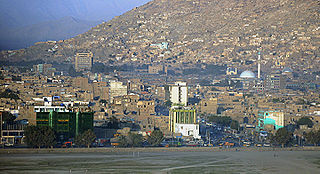
The United Nations Assistance Mission in Afghanistan is a UN Special Political Mission tasked with assisting the people of Afghanistan.

The United Nations Integrated Mission in East Timor (UNMIT) was established on 25 August 2006 by UN Security Council Resolution 1704. Its objectives are "to support the Government in consolidating stability, enhancing a culture of democratic governance, and facilitating political dialogue among Timorese stakeholders, in their efforts to bring about a process of national reconciliation and to foster social cohesion". In its most recent resolution on UNMIT, the Council extended its mandate until 26 February 2012. UNMIT and ISF troops left the country at the end of 2012.
United Nations Security Council Resolution 1746, adopted unanimously on March 23, 2007, after reaffirming all resolutions on the situation in Afghanistan, including resolutions 1659 (2006) and 1662 (2006), the Council extended the mandate of the United Nations Assistance Mission in Afghanistan (UNAMA) for an additional period of twelve months, until March 23, 2008.

United Nations Security Council Resolution 1917, adopted unanimously on March 22, 2010, after recalling its previous resolutions on Afghanistan, in particular resolutions 1868 (2009), 1662 (2006) and 1659 (2006), the Council extended the mandate of the United Nations Assistance Mission in Afghanistan (UNAMA) until March 23, 2011 and realigned its mandate to assist with government-led recovery efforts.

United Nations Security Council Resolution 1919, adopted unanimously on April 29, 2010, after recalling resolutions 1674 (2006), 1894 (2009) on the protection of civilians in armed conflict, 1612 (2005) and 1882 (2009) on children in armed conflict, 1502 (2003) on the protection of humanitarian and United Nations personnel, and 1325 (2000), 1820 (2008), 1888 (2009), and 1889 (2009) on women, peace, and security, the Council extended the mandate of the United Nations Mission in Sudan (UNMIS) until April 30, 2011 with the intention of renewing it further if necessary.

United Nations Security Council resolution 1378, adopted unanimously on 14 November 2001, after reaffirming all resolutions on the situation in Afghanistan, including resolutions 1267 (1999), 1333 (2000) and 1363 (2001), the Council affirmed that the United Nations would play an important role in the country and called for the establishment of a transitional administration leading to the formation of a new government.

United Nations Security Council Resolution 1933, adopted unanimously on June 30, 2010, after reaffirming resolutions 1893 (2009), 1911 (2010) and 1924 (2010) on the situation in Côte d'Ivoire and Resolution 1885 (2009) on the situation in Liberia, the Council extended the mandate of the United Nations Operation in Côte d'Ivoire (UNOCI) and supporting French forces until December 31, 2010, and expanded UNOCI's mandate with provisions to strengthen its capacity to consolidate stability in the country.

United Nations Security Council resolution 1401, adopted unanimously on 28 March 2002, after recalling all previous resolutions on the situation in Afghanistan, including resolutions 1378 (2001), 1383 (2001) and 1386 (2001), the Council endorsed the establishment of the United Nations Assistance Mission in Afghanistan (UNAMA). It would replace the longstanding United Nations Special Mission to Afghanistan.

United Nations Security Council resolution 1471, adopted unanimously on 28 March 2003, after reaffirming all resolutions on the situation in Afghanistan, the Council extended the mandate of the United Nations Assistance Mission in Afghanistan (UNAMA) for an additional period of twelve months until 28 March 2004.

United Nations Security Council resolution 1536, adopted unanimously on 26 March 2004, after reaffirming all resolutions on the situation in Afghanistan, particularly Resolution 1471 (2003), the council extended the mandate of the United Nations Assistance Mission in Afghanistan (UNAMA) for an additional period of twelve months until 26 March 2005.
United Nations Security Council Resolution 1943, adopted unanimously on October 13, 2010, after reaffirming all resolutions on the situation in Afghanistan and terrorism, including resolutions 1267 (1999), 1368 (2001), 1373 (2001), 1386 (2001), 1510 (2003), 1822 (2008), 1833 (2008), 1890 (2009), 1904 (2009) and 1917 (2010), the Council extended the authorisation of the International Security Assistance Force (ISAF) operating in the country for a period of one year.

United Nations Security Council resolution 1589, adopted unanimously on 24 March 2005, after reaffirming all resolutions on the situation in Afghanistan, particularly Resolution 1536 (2004), the council extended the mandate of the United Nations Assistance Mission in Afghanistan (UNAMA) for an additional period of twelve months until 24 March 2006.

United Nations Security Council Resolution 1974, adopted unanimously on March 22, 2011, after recalling previous resolutions on Afghanistan, in particular 1917 (2010), the Council extended the mandate of the United Nations Assistance Mission in Afghanistan (UNAMA) for a period of one year until March 23, 2012.

United Nations Security Council Resolution 1659, adopted unanimously on February 15, 2006, after recalling previous resolutions on the situation in Afghanistan, particularly resolutions 1378 (2001), 1383 (2001) and 1589 (2005), the Council endorsed the "Afghanistan Compact" between the Afghan government and international community concerning the future of the country.

United Nations Security Council Resolution 1662, adopted unanimously on March 23, 2006, after reaffirming all resolutions on the situation in Afghanistan, including resolutions 1589 (2005) and 1659 (2006), the Council extended the mandate of the United Nations Assistance Mission in Afghanistan (UNAMA) for an additional period of twelve months.

United Nations Security Council Resolution 2008 extended the mandate of the United Nations Mission in Liberia (UNMIL) for one year, until 30 September 2011. It was unanimously adopted on 16 September 2011.
United Nations Security Council Resolution 1870, unanimously adopted on 30 April 2009, extended the mandate of the United Nations Mission in Sudan for another year urging all parties to comply fully with the 2005 Comprehensive Peace Agreement that ended a 21-year civil war between north and south Sudan.
United Nations Security Council Resolution 1833 was unanimously adopted on 22 September 2008.

United Nations Security Council Resolution 1894 was unanimously adopted on 11 November 2009.
United Nations Security Council Resolution 1806 was unanimously adopted on 20 March 2008.











